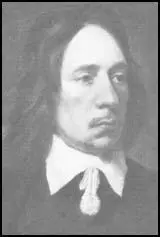John Bradshaw

John Bradshaw, the son of a landowner in Cheshire, was born near Stockport in 1602. He was educated at Gray's Inn and was called to the Bar in 1627.
In 1647 Bradshaw was appointed Chief Justice of Cheshire and North Wales and in 1649 agreed to become president of the trial of Charles I. Bradshaw was rewarded by Oliver Cromwell by being appointed Permanent President of the Council of State and Chancellor of the Dutchy of Lancaster.
A supporter of a democratic republic, Bradshaw disliked Cromwell's authoritarian rule. When Bradshaw opposed Cromwell dissolution of the House of Commons in 1653 he lost his post as Chief Justice of Cheshire and North Wales.
John Bradshaw died in 1659. After the Restoration a special court was appointed and in October 1660 those Regicides who were still alive and living in Britain were brought to trial. Ten were found guilty and were sentenced to be hung, drawn and quartered. This included Hugh Peters, John Jones and Thomas Harrison.
John Bradshaw, Oliver Cromwell, Henry Ireton and Thomas Pride were all posthumously tried for high treason. They were found guilty and in January 1661 their corpses were exhumed and hung in chains at Tyburn.
